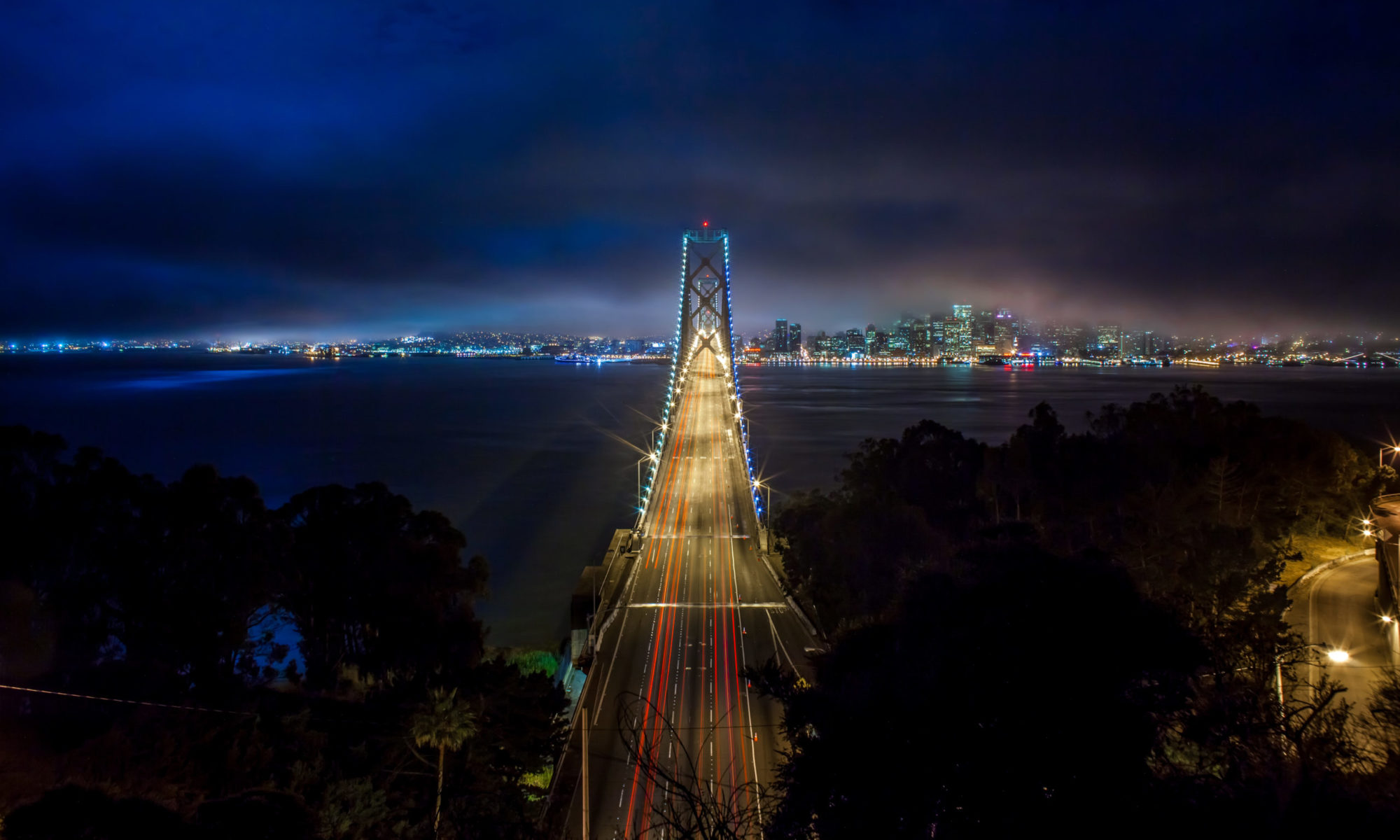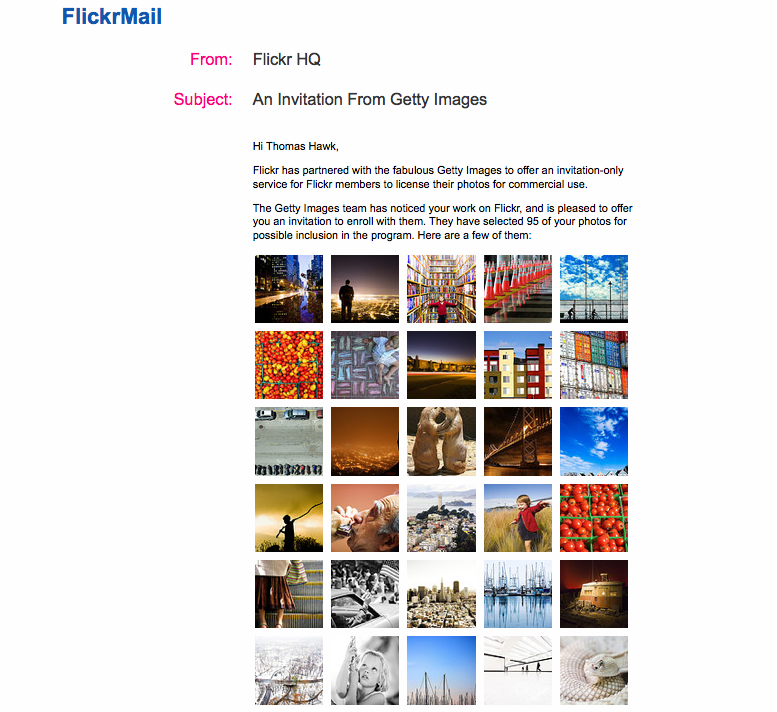
I thought I’d put out a post after I received my first earnings report (which I received today) from stock photography agency Getty Images. I signed up to have Getty represent 60 of my individual photographs as part of the recent deal between Getty Images and Flickr. The Flickr/Getty arrangement is by invite only and Getty initially selected about 90 of my images. I listed all of the images that they asked for that didn’t need model releases (which was 60). Most of the other images that they wanted where model releases were needed are of me or my family, so I’ll probably add those to the collection as well in the next few weeks.
So in my first month of production with Getty I sold two of the 60 images. Those two images totaled $689.97 in fees to Getty and $138.00 (my 20% cut) to me. At the same time that I’d signed up with Getty I also listed 24,917 of my photos with the upstart stock photography agency ClusterShot. ClusterShot, started by Canadian web development company silverorange which was co-founded by Pal Daniel Burka (who is also Creative Director at Digg), offers photographers an ability to list their photos there and pays them out 88% of the proceeds. Unfortunately in my first month or so with ClusterShot I didn’t sell any photos.
Which raises the question, is 20% of something better than 88% of nothing?
While I really, really, really like the ClusterShot model, and especially the fact that the majority of the sales proceeds go to the content creator, unless companies like ClusterShot are able to attract buyers to buy these photos, I’m not sure how successful they will end up being in the end. There is something to be said for Getty’s dominant role as the largest provider of stock photography in the world. Because Getty has the existing customers already signed up, at least today, it seems like they are far more likely to sell more images than ClusterShot. On the other hand, you can sell a lot fewer images at ClusterShot and still make more money because the payout there is so much higher. At present I’m trying both to see how they both work.
I think another area where Getty has a big advantage is in their reputation for clearing images. Especially in today’s litigious environment, image buyers are likely to feel more comfortable with Getty’s vetting of images for needed model and property releases than they might be for ClusterShot’s free for all. At ClusterShot there is no image review process where they determine if images need releases or not. And while in some cases (say an image of flower or a rose) no release may be needed, in many other cases a model release is clearly needed. Since the image buyer is ultimately the one on the hook for publishing images without correct releases, an image buyer might consider an agency like Getty as a safer place to purchase their images.
More than both Getty and ClusterShot though, the majority of my licensing income last month came from direct purchases. I sold five photos directly last month for about $2,000 total. I got to keep 100% of that. I was not marketing those images directly in any meaningful way, they were just inquiries that people sent my way after finding images of mine that they wanted to use on Flickr, Google Image Search, etc. The buyers were natural buyers of stock photography, a couple of magazines (including Popular Photography), a visitor’s convention bureau, a local newspaper and a private company for their brochure.
Now in the future things very well may change. Personally I think it’s more likely that you’d see ClusterShot (or a company like them) gain traction and market share than it is that I’d see Getty raise their payouts. In the meantime I’ll continue in the near term using both and watching and reporting on how things go.
I will say also that I’ve been pretty impressed with things from the service side of Getty Images. I had some initial glitches getting my photos on their platform, but they fixed my problem and I’ve found the Getty staff to be very helpful and responsive in the Flickr/Getty members only forum on Flickr. Late last week Getty also invited all existing Flickr/Getty members an opportunity to submit five new images to Getty in a promotion entitled “It’s Your Turn.” Apparently Getty is also in the process of inviting additional images into their collection both from new and existing Flickr/Getty contributors, although they have not invited any additional images of mine since the first 90.
I think one of the cool things also with ClusterShot is that they can use the Flickr API to pull your photos directly from Flickr for sale. This makes it far easier than uploading your shots directly to their site. They also pull over your tags and keywords in this process so that your photos are immediately optimized for search on their site. You can also set ClusterShot up so that they pull over all your new photos to their site for sale as you upload them to Flickr as well. That’s slick.
If you want to see my Getty Images presently for sale, you can see those here.
If you want to see my ClusterShot Images presently for sale, you can see those here.
Update: I emailed PR reps from Getty, Yahoo and ClusterShot regarding this article and asking for more specific sales stats. Getty said that they are not presently sharing any sales stats on this program and I got the following email response back from Dan James at ClusterShot:
Hey Thomas,
Thanks for the review. Overall we feel it’s fair and well balanced. A few of our reactions in point form:
– We take it as a huge compliment to even be compared to Getty. They are so well established. Our site is brand new.
– We want to build tools to easily facilitate and automate the sale of that $2,000 you sold privately. We’re going to be building more tools and features focused precisely in that area in the months to come. Hopefully they’ll be useful enough for you to use.
– Right now we are trying to not be perceived as a destination to come and look for stock photos. At least initially. There are many people much better at storing, searching, and sharing photos than us. We want to make the service that sells the photo and ties into all of those other great sites. We’re going to building a full API for this in the coming months. This API will also be encourage to be used by makers of self-hosted gallery solutions as well.
– Currently we have ~1,000 photographers with 160K images for sale. Virtually all of our sales (which is in the dozens, not hundreds) are from photographers who are using ClusterShot as a place to feature and promote their work to previously established offline customers.






